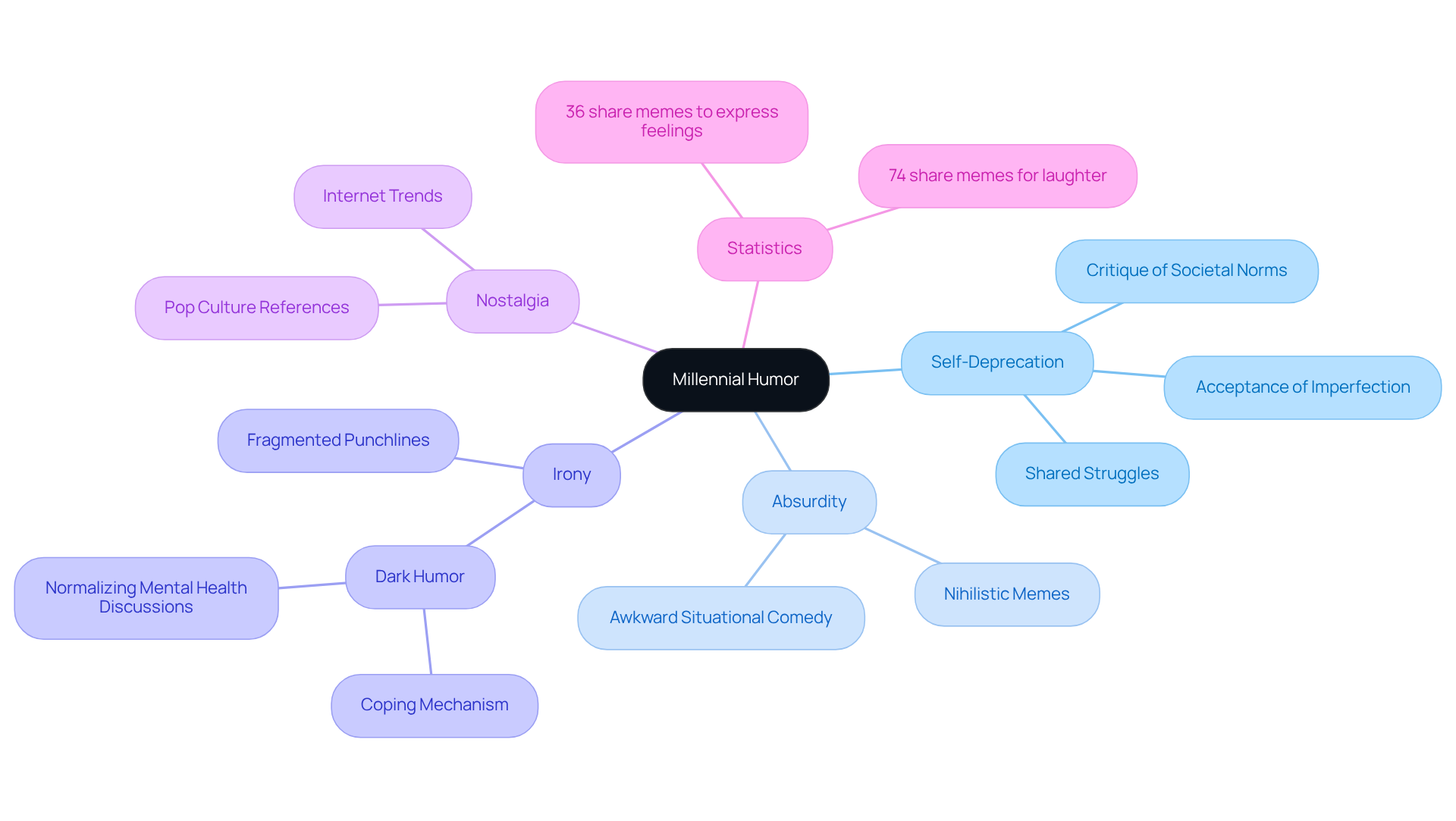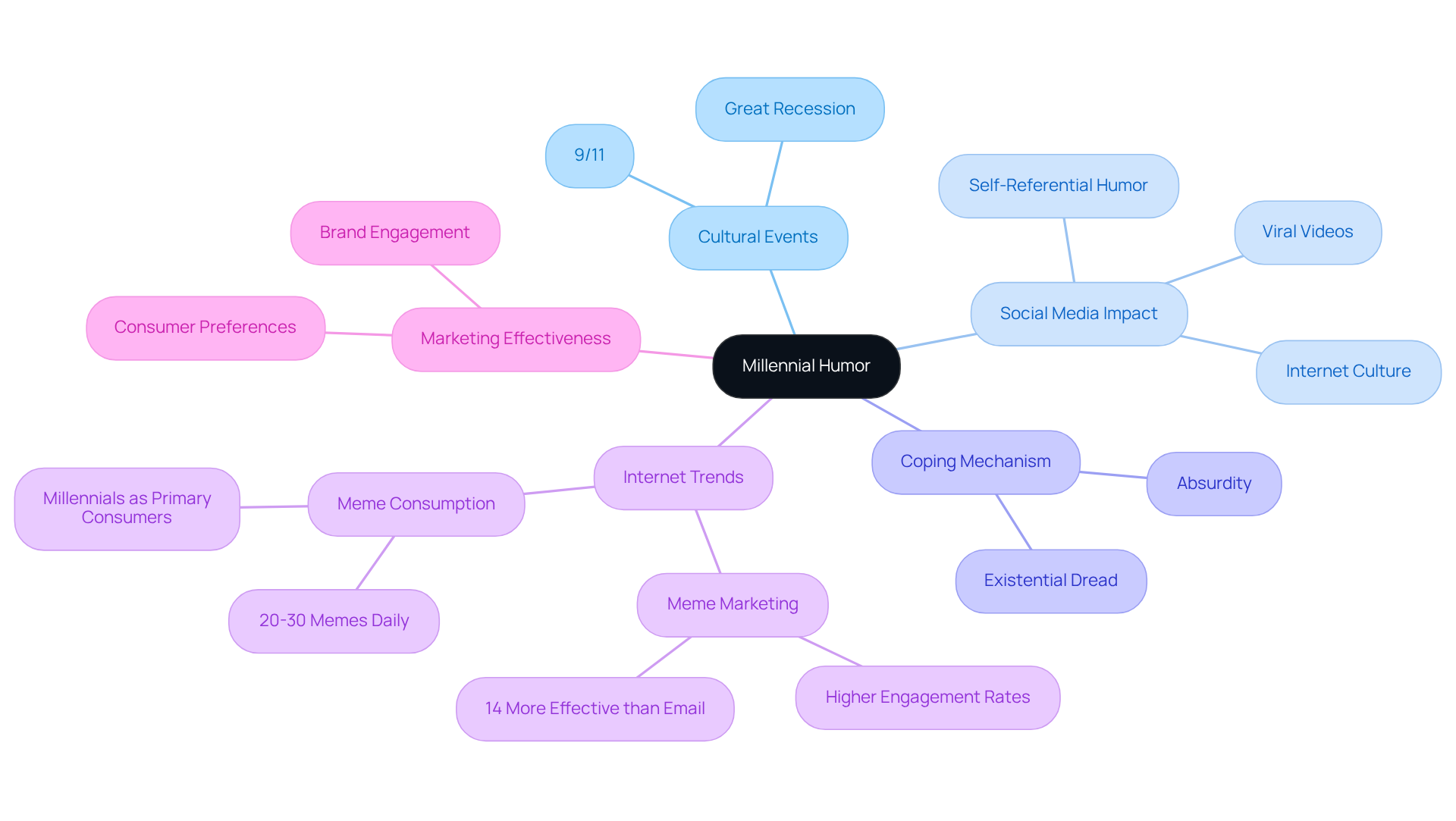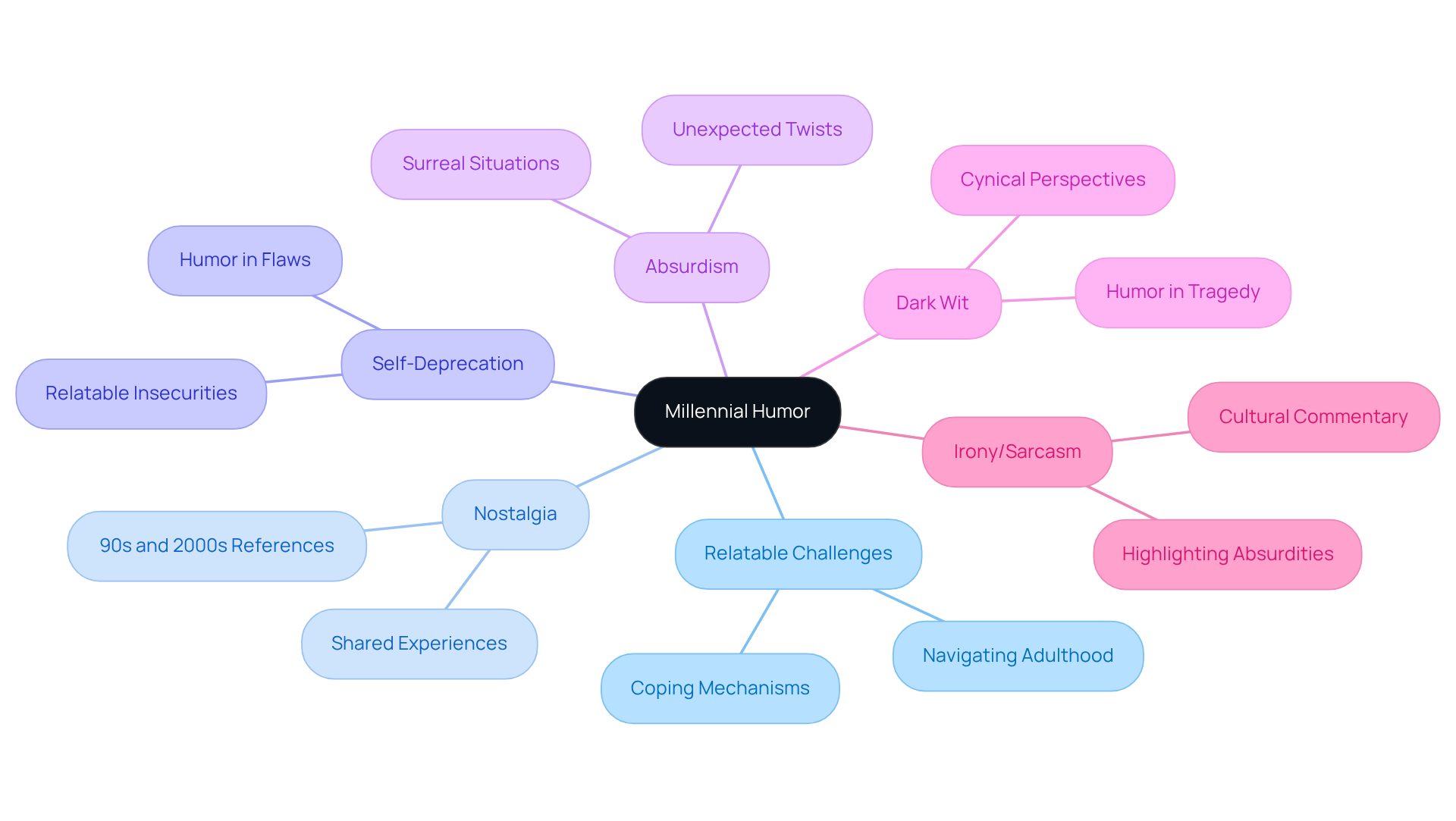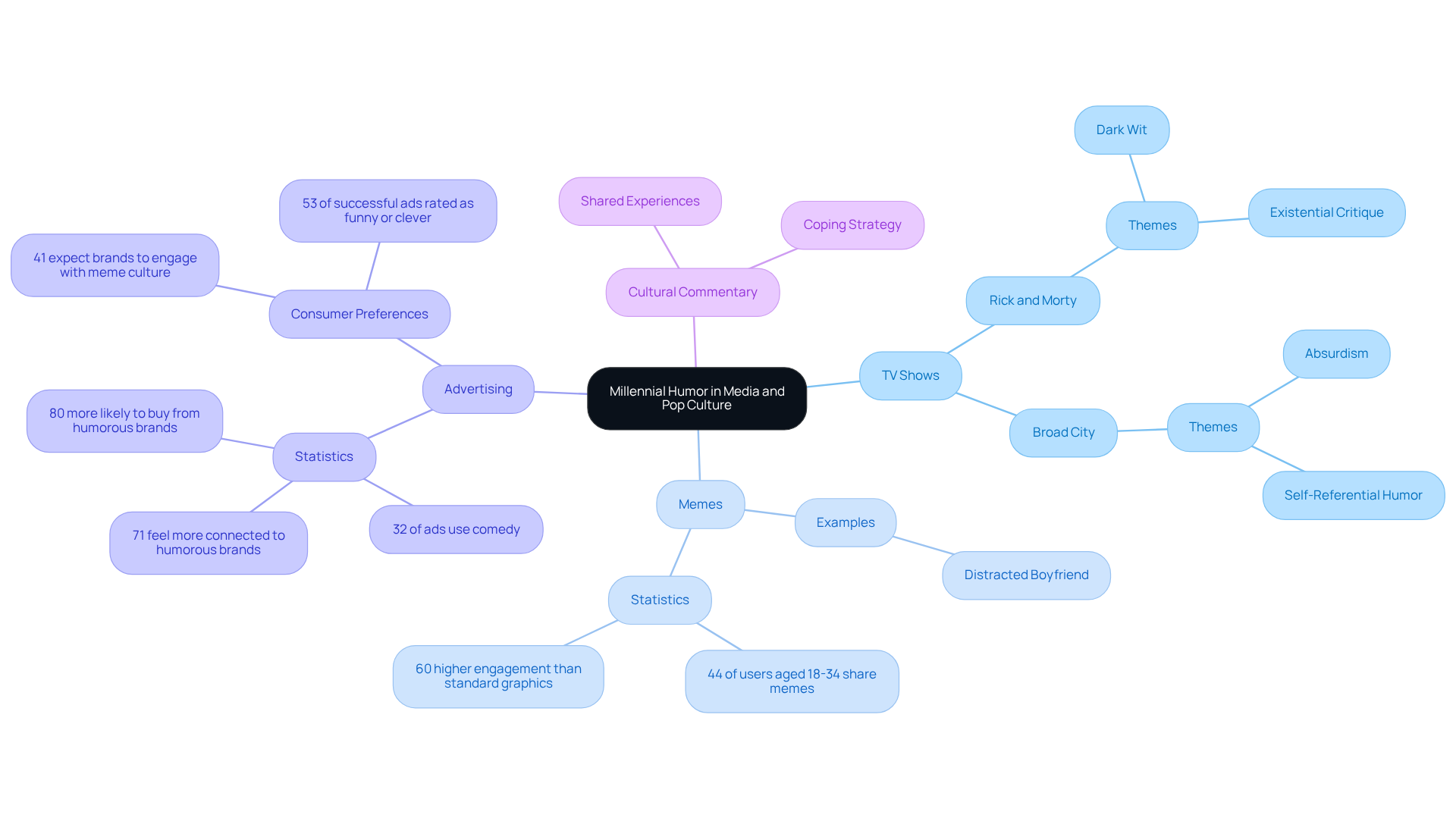Overview
Millennial humor often reflects a deep sense of self-deprecation, absurdity, and a unique blend of irony and nostalgia. This humor acts as a coping mechanism, helping many navigate the complexities of modern life. It's important to recognize how millennials use this humor to address the societal pressures and personal challenges they face. Through their engagement with pop culture and social media, they foster a sense of community and shared experience, creating connections that can be incredibly supportive. By understanding this dynamic, we can appreciate the role humor plays in their lives, offering a comforting reminder that they are not alone in their struggles.
Introduction
Millennials find themselves navigating a world filled with economic uncertainty and rapid societal change, often turning to humor as a vital coping mechanism. This unique sense of humor—rich with self-deprecation, absurdity, and a nostalgic nod to pop culture—serves not only as entertainment but also as a means of connection and critique. Yet, what happens when this humor, deeply rooted in shared experiences and cultural commentary, clashes with the serious realities of modern life? By exploring the defining traits and contexts of millennial humor, we can uncover both its significance and the challenges it poses in our rapidly evolving landscape. Together, we can understand how to embrace this humor as a source of strength and community.
Define Millennial Humor: Key Characteristics and Traits
The pressures faced by millennials often give rise to a , characterized by self-deprecation, absurdity, and a unique blend of irony and nostalgia. This generation utilizes a millennial sense of humor as a coping mechanism, which helps them of economic instability and societal expectations. They find solace in awkward situational comedy, with shows like 'The Office' and 'Parks and Recreation' reflecting their lived experiences.
As they share their stories, Millennials frequently reference pop culture, employing internet trends to articulate their humor. It's noteworthy that:
- 36% of young consumers
- 74% do so simply to elicit laughter
This highlights the vital role that humor plays in their social interactions and emotional well-being. For brands, this behavior presents a wonderful opportunity to connect with Millennials through . By weaving humor into their messaging, companies can foster engagement and build a sense of community.
The prevalence of self-deprecating wit among Millennials is a clear example of their millennial sense of humor, showcasing their acceptance of imperfection and shared struggles. This openness allows them to while .
Case studies show that such wit not only normalizes conversations around mental health but also creates a shared language for articulating difficult emotions. For example, brands that skillfully incorporate in their marketing can forge a relatable identity that resonates with Millennial consumers, ultimately nurturing brand loyalty and engagement.

Explore the Cultural Context: Origins of Millennial Humor
Millennial comedy emerges from a cultural landscape shaped by and the Great Recession. These experiences have fostered a sense of disillusionment and absurdity, resulting in a comedic style that often reflects existential dread and irony. Many millennials engage with an average of 20 to 30 humorous images daily, highlighting their as a coping mechanism.
The rise of social media has transformed this comedy further, allowing millennials to share and create content in real-time. This vibrant environment has cultivated a unique blend of internet culture, viral videos, and self-referential humor, which are central to their comedic expression.
As Karp notes, "This is the risk associated with internet trends and comedy: You do become numb to the significance of the subject," underscoring how humor is often wielded to confront serious issues. Understanding this context is essential to grasp why millennials frequently approach weighty topics with a , using that humor to navigate their complex realities.
Additionally, have proven to be 14% more effective in enhancing click-through rates than traditional email marketing, illustrating the power of wit in . Yet, it's vital to also reflect on the , as the expanding meme industry contributes to rising carbon emissions, raising important questions about sustainability.

Identify Distinctive Features: What Sets Millennial Humor Apart
often embodies a by addressing the relatable challenge of , blending nostalgia and self-deprecation with and . Many millennials reflect on their childhood and adolescent experiences, often employing a millennial sense of humor to cope with the complexities of growing up. This comedy frequently draws on references from the , fostering a sense of that resonates deeply with this generation.
The , often found in memes, showcases the millennial sense of humor by highlighting the and creating a space for connection and understanding. This unique blend of characteristics sets millennial comedy apart from the more direct and , showcasing a millennial sense of humor that offers a nurturing and relatable perspective many can appreciate.

Examine Examples: Millennial Humor in Media and Pop Culture
Millennial comedy resonates deeply across various media, especially in beloved television shows like and 'Broad City.' These series capture the absurdist and self-referential qualities that reflect a , often tackling serious themes with a lighthearted touch. For instance, 'Rick and Morty' employs dark wit and intricate narratives to critique societal norms, serving as a grappling with existential anxieties in our fast-paced world.
beautifully illustrate this generational wit. Memes like the 'Distracted Boyfriend' not only entertain but also act as cultural commentary, reflecting shared experiences and frustrations among millennials. Research indicates that 32% of all advertisements incorporate comedy, which aligns with the millennial preference for content that resonates on an . In fact, 71% of consumers report feeling more connected to brands that make them laugh, highlighting the profound impact of humor in marketing. Yet, only 18% of brands , revealing a significant opportunity for brands to forge with their audiences.
Moreover, , underscoring the prevalence and influence of this form of humor in millennial culture. These humorous expressions often challenge societal expectations, making them both relatable and thought-provoking. As millennials navigate a rapidly changing landscape, their millennial sense of humor serves as a coping strategy, fostering community and connection through shared laughter. This dynamic interplay between humor and cultural commentary emphasizes the in shaping effective marketing strategies and engaging with this influential demographic. Together, we can cultivate a deeper appreciation for the nuances of millennial comedy, paving the way for more meaningful interactions in the marketplace.

Conclusion
The millennial sense of humor embodies a unique blend of irony, absurdity, and self-deprecation, serving as a vital coping mechanism in navigating the complexities of modern life. This distinctive comedic style not only mirrors the challenges faced by this generation—such as economic instability and societal pressures—but also nurtures a sense of community and belonging. By embracing humor as a tool for connection, millennials cultivate a shared language that resonates deeply across various platforms, from memes to television shows.
As we explore this topic, it becomes clear that millennial humor is shaped by cultural events and the rise of social media, allowing for real-time expression and engagement. The prevalence of self-referential comedy and nostalgic references reveals a generational perspective that addresses the absurdities of adulthood while gently critiquing societal norms. Furthermore, the impact of humor in marketing strategies highlights a significant opportunity for brands to connect authentically with millennial consumers, fostering deeper relationships.
Understanding the nuances of millennial humor is essential for nurturing meaningful interactions in both social and commercial contexts. As this generation continues to navigate a rapidly changing landscape, the humor they cultivate not only offers solace but also challenges societal expectations. By embracing this unique perspective, we can pave the way for more effective communication and engagement strategies, ultimately fostering deeper connections and a greater appreciation of the complexities that define millennial experiences. Together, let us recognize the power of humor as a bridge to understanding and connection.
Frequently Asked Questions
What are the key characteristics of millennial humor?
Millennial humor is characterized by self-deprecation, absurdity, and a unique blend of irony and nostalgia. It often serves as a coping mechanism for the pressures faced by this generation.
How does millennial humor help in coping with societal pressures?
Millennials use humor to navigate complexities such as economic instability and societal expectations, finding solace in awkward situational comedy that reflects their lived experiences.
What role does pop culture play in millennial humor?
Millennials frequently reference pop culture and internet trends in their humor, which helps them articulate their experiences and connect with others.
How do millennials use memes in their humor?
According to statistics, 36% of young consumers share memes to express their feelings, while 74% do so to elicit laughter, highlighting the importance of humor in their social interactions.
What opportunities do brands have to connect with millennials through humor?
Brands can connect with Millennials by incorporating authentic and relatable humor into their messaging, fostering engagement and building a sense of community.
How does self-deprecating humor reflect millennial values?
Self-deprecating humor showcases Millennials' acceptance of imperfection and shared struggles, allowing them to critique societal norms while cultivating a sense of belonging.
What impact does humor have on conversations about mental health among millennials?
Self-deprecating wit normalizes conversations around mental health and creates a shared language for articulating difficult emotions, making it easier to discuss such topics.
How can brands effectively use self-deprecating humor in marketing?
Brands that skillfully incorporate self-deprecating humor can forge a relatable identity that resonates with Millennial consumers, ultimately nurturing brand loyalty and engagement.




